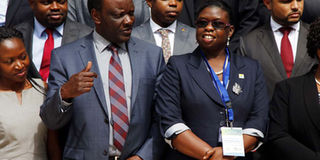Revenue authorities plot an end to multinational companies criminal tax activities

Uganda Revenue Authority, Commissioner General Doris Akol (R) listens to Africa Tax Administration Forum, director capacity building, Kennedy Onyonyi (L) during a meeting of tax officials from 18 African countries at Serena Hotel Kampala August 24, 2015. PHOTO BY STEPHEN WANDERA
Uganda Revenue Authority (URA) has entered into partnership with the continent tax bodies in a move to wipe out illicit financial flows from Africa.
A report on illicit financial flows (IFFs) estimates that Uganda loses at least Shs1.5 trillion every year to illegal activities perpetrated by the multinational companies.
The money lost is nearly an equivalent of four times the budget allocated for agriculture.
In the same report, the African Union/Economic Commission for Africa High Level Panel on Illicit Financial Flows from Africa report, chaired by former South African president Thabo Mbeki, shows that the multinational companies in Africa deny the continent its due share of revenue through tax evasion, money laundering and false declaration.
Other illegal methods used include overpricing, transfer pricing, tax evasion, money laundering, corruption and false declarations, all posing a major threat to the development of the continent.
“African countries have been dominated by abusive and manipulative practice by multinational enterprises (MNEs) to reduce their rightful tax liabilities through aggressive and harmful tax planning,” URA commissioner general, Ms Doris Akol, said yesterday at the Legal Counsel Workshop for African Tax Administrations in Kampala.
She continued: “The Practice by MNEs to use gaps in interaction of different tax systems to artificially reduce tax income or shift profits to low tax jurisdictions remains a matter of grave concern. This is because they account for a significant share of African tax base.”
According to Ms Akol, what is at stake is corporate Income Tax (CIT) which accounts for 29 per cent of total taxes in Africa.
To avoid such revenue losses, Ms Akol said there is a need for joint action by legal experts in tax administrations across Africa. And the African Tax Administration Legal Counsel Network comes in handy in wiping illicit financial flows (IFFs) from Africa.
The African Tax Administration Forum director of finance and Corporate Affairs, Ms Ediretse Mokara in her remarks yesterday said, they have embarked on what she described as an all-inclusive approach to addressing African tax matters.
She said: “After successfully putting in place structures to deal with tax administration issues, we are now extending our sphere of influence to include tax policy and tax legislation. This workshop is the first major step towards establishing structures to address tax legislation matters.”
She continued: “We need to engage intensely and continuously as we seek solutions to legal challenges faced by African tax administrations. ATAF had foreseen the need for inter-country collaboration. It is against this backdrop that the organisation drafted the ATAF Agreement on Mutual Assistance on Tax Matters.
This agreement provides a legal framework for engagement among member countries. It not only provides for information sharing, but also stipulates joint activities.
Utility
Africa currently loses about $50 billion (about Shs160 trillion) each year through illicit activities of multinational companies and rich individuals.
“The multiplier effects of these losses are much larger. IFFs in real terms mean loss of jobs, income, decent education, health facilities and other basic infrastructure critical to structurally transform the economy of countries in Africa and the socio-economic conditions of Africans,” reads the report.




